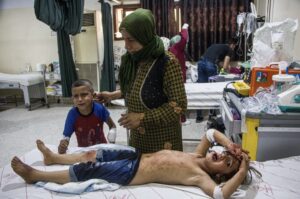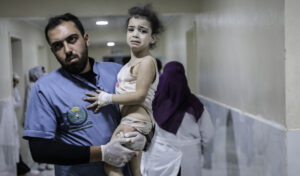Russia-Syria Alliance: Perpetrators of War Crimes and Crimes Against Humanity
twelve years have passed since decade since the peaceful uprising in Syria turned into a brutal conflict. Since the start, parties to the conflict have flagrantly disregarded human rights and humanitarian law protections, and the plight of the Syrian people continues to worsen. Parties involved in the conflict have consistently disregarded human rights and humanitarian law protections, resulting in immense suffering for the population. The Syrian-Russian military alliance has been implicated in war crimes and violations of international humanitarian law. The situation is exacerbated by an economic crisis, obstacles to humanitarian aid and reconstruction, arbitrary detentions, torture, displacement, and ongoing violations of women’s rights.
In May 2021, Bashar al-Assad secured a fourth term as president for seven more years in elections that did not occur under the auspices of the United Nations-led political process and failed to adhere to standards for free and fair elections. His renewed term as president came as his security services continued to subject hundreds, including returning refugees, to arbitrarily arrest and torture, while millions go hungry due to his government’s diversion of aid and failure to equitably address a debilitating economic crisis brought on primarily by the destruction of infrastructure and crises in neighboring countries.
War Crimes and Humanitarian Law Violations:
The Russian-Syria alliance has conducted indiscriminate aerial bombings of civilian infrastructure, including schools, hospitals, and markets, resulting in the loss of countless innocent lives. The Russian air force alone has carried out thousands of airstrikes. causing civilian deaths and destruction. These acts constitute war crimes and violate international humanitarian law.
Prohibited attacks by the Syrian-Russian military alliance continue to be used in Idlib where, despite a tenuous ceasefire, the alliance still poses a threat to over three million civilians trapped there.
Despite the government’s record of human rights abuses against its own citizens, this year also saw several countries normalize with the Syrian government, and make commitments to cooperate, leading to concerns about the premature return of refugees and potential facilitation of rights abuse.
Economic Crisis and Implications:
The economic toll of the war in Syria has been staggering, with estimates placing it at $1.2 trillion by 2021. The destruction of infrastructure and massive displacement caused by the conflict have contributed significantly to this crisis. As a result, more than 90% of the population now lives below the poverty line, and millions are food insecure. The Syrian government’s failure to address bread and fuel shortages and provide adequate assistance exacerbates the situation.
Obstacles to Humanitarian Aid and Reconstruction:
The Syrian people face significant challenges in accessing humanitarian aid. Millions in northeast and northwest Syria depend on cross-border assistance, but non-UN agencies lack the capacity to meet the growing needs. The closure of UN aid supplies and funding restrictions denies vital assistance to millions of people. Additionally, the Syrian government imposes severe restrictions on the delivery of aid in government-held areas and diverts aid to punish dissenting voices.
Arbitrary Detentions, Torture, and Enforced Disappearances:
Syrian security forces and government-affiliated militias continue to arbitrarily detain and mistreat people across the country. Thousands remain locked away in Syria’s secretive detention system, with no knowledge of their whereabouts. Reports of torture and enforced disappearances are widespread, with sexual violence also documented in government facilities. The situation is dire for returnees and individuals in retaken areas who have signed reconciliation agreements.
Women’s Rights and Gender-Based Violence:
Women in Syria continue to face discrimination, particularly in relation to marriage, divorce, child custody, and inheritance. While some amendments have been made to the law, women still face punishment for acts of disobedience relating to mobility. The penal code also criminalizes homosexuality, and men and nonbinary individuals face severe consequences under this law.
Displacement Crisis:
The displacement crisis in Syria remains dire, with millions forced to flee their homes. Returnees face human rights violations, including arbitrary detention, torture, forced disappearances, and economic hardship. The safety


